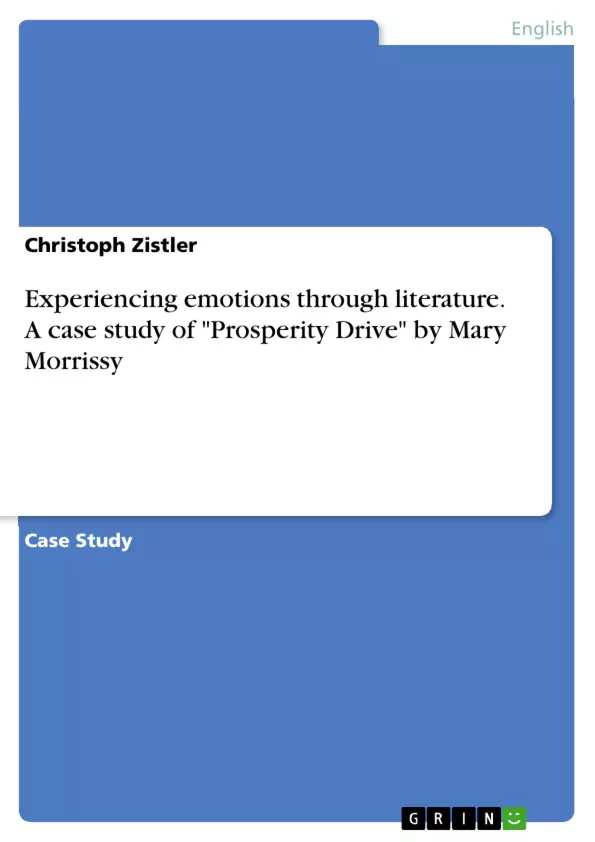The aim of this paper is to study emotions in literature, but specifically not the emotional response of a given actual reader, but the emotional responses connected to the authorial intention and an imagined authorial audience. Although the authorial intention can obviously not be fully grasped without consulting the author itself and without accumulating quite specific data surrounding the life of the author and the creation process of the text, this paper serves as one possible interpretation of the primary source and its emotional framework. Especially as there are none to be found so far about this particular source.
The primary source for this paper will be the short story collection "Prosperity Drive" published in 2016 by Irish writer Mary Morrissy. As an illustration of the conveyed emotions, then, the aspects of narrative mode, choice of words and texture features have been chosen because they encompass many areas in which the authorial intention of emotional conveyance can be observed and shall be analysed through a close-reading approach. Because of the above-mentioned points of subjectivity, however, this does by no means represent an exhaustive list.
Inhaltsverzeichnis (Table of Contents)
- Introduction
- The evocation of emotions in Prosperity Drive
- Narrative mode
- Choice of words
- Texture features
- Conclusion
- Works cited
Zielsetzung und Themenschwerpunkte (Objectives and Key Themes)
This paper aims to analyze the emotional responses evoked in readers by a literary text, focusing on the authorial intention and an imagined authorial audience rather than the subjective experiences of individual readers. It explores how the author uses narrative mode, choice of words, and texture features to convey emotions in their writing, using Mary Morrissy's short story collection "Prosperity Drive" as a primary source.
- The role of narrative mode in evoking emotions
- The impact of word choice on emotional responses
- The importance of texture features in conveying emotions
- The concept of an authorial audience and its relevance to emotion studies
- The limitations of focusing on subjective emotional responses in literary analysis
Zusammenfassung der Kapitel (Chapter Summaries)
The introduction establishes the focus of the paper on analyzing emotions in literature through the lens of authorial intention and an imagined audience. It highlights the subjective nature of emotions and the importance of understanding the shared emotional framework that underlies language and literature. The chapter then introduces the concept of authorial intention and how it relates to emotional responses in readers. The chapter concludes by outlining the methodology used in the paper and introducing the primary source, Mary Morrissy's "Prosperity Drive," as well as the specific aspects of the text that will be analyzed: narrative mode, choice of words, and texture features.
Chapter 2 explores the role of narrative mode in evoking emotions in readers. It analyzes the use of intradiegetic heterodiegetic narration in "Prosperity Drive" and its implications for conveying emotions. The chapter also examines the impact of switching to a second-person narrative mode in the short story "Drag" and its potential to increase audience immersion and evoke specific emotional responses. The analysis highlights the interplay between immediacy and distance created by different narrative modes and their influence on the reader's emotional experience.
Schlüsselwörter (Keywords)
This paper focuses on the themes of emotion, literature, narrative mode, authorial intention, and authorial audience. It explores the intersection of these concepts through a close-reading analysis of Mary Morrissy's short story collection "Prosperity Drive," highlighting the use of specific literary techniques to convey emotional responses in readers. The paper emphasizes the importance of understanding the shared emotional framework that underlies human communication and the limitations of studying purely subjective emotional responses in literary analysis.
- Arbeit zitieren
- Christoph Zistler (Autor:in), 2022, Experiencing emotions through literature. A case study of "Prosperity Drive" by Mary Morrissy, München, GRIN Verlag, https://www.hausarbeiten.de/document/1436736


